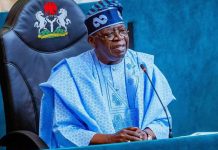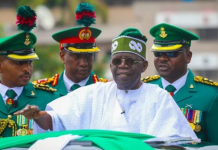After an unexpectedly sluggish start (it took him longer than usual to appoint his spokesperson, which conduced to the luxuriant flowering of avoidable rumors and disinformation), President Bola Ahmed Tinubu is finally decisively stamping his authority on the Nigerian political space with a frenetic blizzard of appointments and disengagements of the personnel of government.
Both supporters and opponents of the president appear flushed with fervor by the ongoing whirlwind of firing and hiring. It has even infused a new leash of life to the notoriously lethargic Nigerian Television Authority (NTA), which has emerged as one of the most reliable sources of news on social media, particularly on Twitter, for Tinubu’s announcements of personnel changes.
But why are people exuberating over routine changes that herald—or should herald—every change of administration? I think there are at least three reasons for this.
The first is the enduring human thirst for novelty for its own sake, which is particularly noticeable among Nigerians who have had the misfortune of being habituated to stagnancy. You can put Nigerians in a perpetual state of suspended animation and rob them silly without their realizing it if you can sustain a never-ending parade of entry and exit of people in and out of the corridors of power. I don’t know why most previous Nigerian leaders, except IBB, haven’t discovered this.
The second reason is that appointments to government positions are the symbolic conduits through which most Nigerians vicariously connect with governance. They feel connected with, and feel a sensation of having a stake in, an administration if someone from their hometown, local government, state, region, religion, or other forms of collective and emotional identification is appointed to an important position.
The demographic profiles of new government appointees also help people to situate a new government’s direction and to get a sense of the identity categories it seeks to privilege or demote. So far, although Tinubu’s appointments cumulatively favor the Southwest, they have shown sensitivity to Nigeria’s many intricate emotional maps.
Tinubu’s appointment of Sokoto-born, Southern Kaduna native Major General Christopher Gwabin Musa as Chief of Defence Staff not only honors merit but also provides a source of indescribable elation and emotional connection for the people of Southern Kaduna and northern Christians who had been some of the firmest foes of Tinubu and APC. I’ve read many northern Christians say the appointment has caused them to reassess their opinions of the new government.
The appointment of Rear Admiral Emmanuel Ogalla as Chief of Naval Staff has also helped to call attention to the Igala-speaking people of Enugu and Anambra states whom most Nigerians didn’t know existed. I imagine, however, that Tinubu probably thought he was appointing an Igbo man when he considered Ogalla for his position.
With a hometown called Enugu Ezike, a local government called Igbo Eze North, and a middle name called Ikechukwu, who would have guessed that Ogalla was an Igala (never mind that Ogalla and Igala kind of rhyme)? It was thanks to some Igbo people on social media that this bit about the man was revealed.
Whatever it is, Tinubu can’t be accused of excluding the Southeast in the Security Council. Ogalla represents the Southeast. He probably speaks Igbo and is also probably culturally Igbo. In any case, many self-identified Igbos in Anambra and Enugu states have Igala or Benin provenance. Most people from Onitsha, for example, have either Bini or Igala ancestral roots, which they are still acutely aware of, even proud of, yet they identify as Igbo.
As the late Professor Harry Garuba pointed out in his chapter contribution to a 2001 book titled Shifting African Identities edited by Martine Dodds, Meshack M. Khosa, and S. B. Bekker, “At the height of the Nigerian Civil War, Nnamdi Azikiwe declared that the Onitsha people really came from Benin, and were thus also descended from the Edos. A wave of public outcry from the Igbos greeted this declaration” (p. 17).
The truth is that our identities aren’t always neat, discrete, self-contained categories; they are often messy, complex, and overlapping in more ways than we care to admit.
Anyway, Tinubu’s 7 National Security Council appointments have 4 southerners and 3 northerners and 5 Christians and 2 Muslims. Given that the president and the vice president (who are also members of the Council) are Muslims, I think this is a reasonably fair and inclusive council, especially in light of Nigeria’s immediate prior experience where no more than two southerners or Christians served on the council at any point during an 8-year rule.
As is now obvious from the preceding point, the third and most important reason Tinubu appears to be exciting Nigerians is attributable to the style of outgone President Muhammadu Buhari. Buhari started his administration in 2015 by precipitously lowering the bar of governance. Before his second term was over, he threw away the bar outright.
By his second term, he wasn’t gratified with just throwing away the bar; he broke it to smithereens. Then he buried the smithereens and exited the stage. That was why I invented the term “ungovernance” to describe his style of ruling.
Tinubu has merely brought a new bar. But for people who have become accustomed to not seeing a bar at all for 8 years, the mere sight of one seems exciting, even revolutionary. I agree that Tinubu deserves plaudits for bringing the bar and for not dithering about taking decisions. But he needs to do more than that. He needs to raise the bar, assess the impact of his decisions, and be humble enough to change course if his decisions inflict material violence on the vast majority of the people.
His government’s sustained assault on subsidies that benefit the poor (such as petrol, electricity, and tuition at higher education institutions) while leaving untouched the extortionate subsidies that fund the epicurean pleasures of Nigeria’s overpampered political class won’t raise the bar of governance. He is being feted by Western financial institutions such as the IMF and the World Bank and applauded by Western financial media outfits such as Bloomberg and the Wall Street Journal, but everyday folks in Nigeria are squirming in excruciating existential torment.
I don’t see how this will end well. What shall it profit a country when it pursues policies that cause the economy to “grow” but causes the people to growl? After the economy has “grown” but the people still groan, where is the growth? The most important growth isn’t the rise in abstract, disembodied, World Bank/IMF-created metrics but in the improvement of the quality of life of everyday folks.
Governance is the other side of a social contract. Social contract rests on the idea that everyday members of a society have agreed formally or informally to give up some of their natural rights and to recognize the authority of people in power in exchange for security and basic economic liberties.
Social cohesion and the sustenance of social order are guaranteed when both parties keep their side of the bargain. Anomie results when either side fails to live up to the terms of the contract. That is why citizens get thrown into jails or fined for offenses ranging from misdemeanors to felonies.
When those who control the levers of the power structure, who enjoy the privilege of being rulers, provide neither security nor basic economic liberties for everyday citizens who give up their natural rights for the sake a common social order that works for everybody, you get rebellion, insurrection, revolt, or even revolutions.
I hope people who love Tinubu cause him to be aware that after the excitement of the welcome motions he has been making peters out, people’s material realities will push them to ask him for movement, movement in the quality of their lives.
The IMF/World Bank-inspired neoliberal nirvana he seems intent on building in Nigeria may create a fertile environment for “foreign investment” and invite the commendations of the financial buccaneers of the West but, like elsewhere in the developing world where this is tried, it will create hell for the poor and wipe out the middle class. It’s already starting.
I also hope that Tinubu’s supporters and inner circle learn from Buhari who was shielded from even the mildest, best-intentioned, and most innocuous criticism. Being in the field of play creates multiple blind spots for players but onlookers, as the saying goes, see most of the game.







